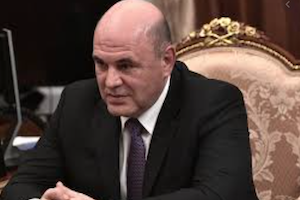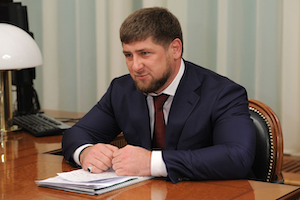The Caucasus on the Edge of Tomorrow
Michael Hikari Cecire and Laura Linderman
February 27, 2025
The Caucasus is today a region traversing a period of escalating instability and profound transformation. Historically characterized by its fragmentation and diversity, the Caucasus remains a patchwork of overlapping identities, allegiances, and grievances. This delicate balance is being disrupted by external and internal pressures, creating a volatile environment that could reshape the region’s geopolitical and social fabric in the years to come.
Russian Elite Infighting Highlights North Caucasus Tinderbox
By Laura Linderman and Michael Hikari Cecire
In early October, Chechen leader Ramzan Kadyrov declared a blood feud against three North Caucasian federal lawmakers, accusing them of plotting his assassination amid a power struggle over the Wildberries e-commerce platform. This incident highlights the escalating tensions and fragility of power within Russian politics, revealing vulnerabilities in the Kremlin's governance amid ongoing conflicts. As regional elites assert their interests, the potential for broader instability increases, particularly against the backdrop of Russia's war in Ukraine. The situation underscores the complex interplay of patronage networks and regional autonomy that could lead to significant shifts in Russia's internal power dynamics.

BACKGROUND: In early October, Chechen strongman Ramzan Kadyrov declared a blood feud against three federal lawmakers—two Dagestani and an Ingush deputy—whom he accused of planning his assassination. The dispute is tied to control over the Russian Wildberries e-commerce website, which had been wrested by forces backed by the Dagestani and Ingush deputies against Kadyrov’s allies, culminating in a deadly shootout at the company’s Moscow headquarters. The company's contentious expansion has also led to intimidation beyond Russia's borders - in October 2024, a JAMnews editor in Georgia received threats of violence from an apparent Chechen supporter after criticizing Wildberries' entry into the Georgian market despite international sanctions. Kadyrov’s rhetoric indicates a profound willingness to use violence and intimidation, highlighting Kadyrov’s belief that he operates beyond Moscow’s control.
More broadly, the Wildberries saga highlights an ongoing scramble among Russian elites for key economic assets, and a deepening sense of growing instability throughout the contest Russian political economy arena. The North Caucasus, is a notable theater for this contestation given its historically restive and fractured contexts. Further, Kadyrov’s willingness to level threats—and the limited reaction it elicited—highlight the privileged position that Kadyrov continues to enjoy in Russia, but also the way other factions are contesting his authority. Kadyrov's comments also mark an escalation in the tensions between regional leaders and the Kremlin, illustrating the fragile balance of power within Russian politics. Kadyrov has long been known for his authoritarian rule, and this incident further showcases his leverage in the ongoing political competition among regional and federal authorities.
The ongoing conflict has drawn attention not only for its immediate violence but also for what it reveals about Russian and North Caucasus patronage networks. The region has long been characterized by real and fictive kinship affiliations that shape local governance and economic relationships. The fallout from the incident may embolden other North Caucasian factions to assert their interests in Moscow, potentially leading to further, and spiraling, destabilization. The Kremlin's haphazard approach to governance in the North Caucasus only further complicates matters. Moscow has historically relied on regional strongmen like Kadyrov to maintain stability, yet this reliance simultaneously breeds conditions for potential conflict.
Against the backdrop of an exhausting military quagmire in Ukraine, institutionally fragile security services and military apparatus made hollower by that war, and elite infighting and uncertainty as Russian President Vladimir Putin ages, the Wildberries incident reveals how Russia’s weak institutions and semi-feudal mode of control may be contributing to feedback loops of internal deterioration and instability. As the situation unfolds, it will be critical to monitor the responses from both the Kremlin and North Caucasian regional power centers, as this may foreshadow larger shifts in Russia's internal power dynamics.
IMPLICATIONS: The broader implications extend far beyond a mere violent confrontation between business interests and political factions. This event reveals profound vulnerabilities in the Russian state, which are particularly exacerbated amid its ongoing war in Ukraine.
The dynamics exposed by this recent incident suggest shifting balance between Moscow and the North Caucasus, highlighting the Kremlin’s internal fragility and the growing assertiveness of regional elites. As the war in Ukraine continues to stretch Russian resources and resolve, the Kremlin’s reliance on figures like Kadyrov to maintain control—or at least the simulacrum of control—can backfire and may kindle wider instability that can be expressed as a broader challenge to Moscow's authority.
The instability generated by Kadyrov and his patronage-based power structure, or other such triggers, could spiral into larger conflicts, not only within Chechnya but across the entire region. The interconnected nature of intertwined North Caucasian business and family groupings means that tensions in one republic can quickly spill over into others, potentially igniting violence that could further destabilize Russia's southern flank. This spillover effect extends beyond Russia's borders into the South Caucasus, as evidenced by threats against journalists in Georgia who criticize Wildberries' regional expansion. Such incidents demonstrate how Russian patronage networks attempt to exert influence through both economic penetration and intimidation in neighboring states, particularly as sanctions push Russian businesses to seek new markets
In addition, the situation signals a growing challenge to the Kremlin’s narrative of centralized control. The framented web of factional loyalties and business interests belie the formal appearance of a centralized state. As North Caucasian elites gain more visibility and influence in Moscow, the Kremlin may find itself increasingly unable to exert authority over these networks. Distracted and increasingly incapable state security structures and empowered regional elites where societal alienation from the Russian body politic is strong (or, as in the case in the North Caucasus, arguably endemic) could boost nationalist sentiments and separatist movements—particularly in the North Caucasus, which have their own historical grievances against the central government.
Finally, the likely distant but non-zero potential for federal disintegration looms. If the Kremlin's grip continues to weaken, the North Caucasus could witness a resurgence of separatist movements, echoing the conflicts of the 1990s and early 2000s. As regional elites compete for power and influence, those efforts could escalate into open conflict with each other and federal authorities—themselves fragmented patronage networks. This suggests not the need for Russia to more adequately fill the regional power vacuum, but perhaps that its tentative dominion over the region has been fundamentally illegitimate and ill-fitting.
CONCLUSION: North Caucasus instability underscores the intricate power dynamics within the region and its fundamentally contingent relationship with the Kremlin. As the Kremlin grapples with material and systemic exhaustion from nearly three years of full-scale war, the North Caucasus could be a leading indicator for generalized instability and regime weakness.
While President Putin has broadly sought to consolidate power and eliminate challenges to federal authority, the reality is Moscow—and Putin himself—have come to rely on regional elites who has operated with semi-independence and in sometimes open defiance of state structures. Kadyrov's brazen threats against federal lawmakers highlight the potential for personal and political rivalries to escalate into violence. This power struggle reveals the dissonance between Moscow's objectives and the realities on the ground, where informal networks and personalistic loyalties can often dictate political outcomes.
Moreover, the ongoing war in Ukraine is exacerbating existing tensions in the North Caucasus, making it increasingly difficult for the Kremlin to maintain stability. The region, with its historical grievances and complex interethnic dynamics, is a potential flashpoint for renewed conflict, especially as federal resources diminish. In a generalized scramble for influence and assets, the North Caucasus may be particularly prone to instability, and under certain circumstances, potentially renewed national movements or separatism. The Wildberries incident thus serves as a harbinger of potential unrest, suggesting that the Kremlin's focus on external conflicts may leave it vulnerable to internal challenges—cultivated by the very system of political economy that it has depended upon to maintain its writ.
More broadly, growing signs of instability in the North Caucasus ask questions of wider regional dynamics, including in the South Caucasus. While separated by certain geographic and especially political features (i.e., borders of the Russian Federation itself), in many respects the North and South Caucasus are a more coherent and permeable cultural space than geopolitical dynamics suggest. Narratives of ethno-linguistic segregation can be politically expedient, but often belie reality. Political controversies aside, Nakh-speaking Chechens and Ingush share a common cultural sphere in many respects with each other and the smaller but prominent Nakh and Georgian-speaking Kist and Bats communities in Georgia’s highlands. Similarly, Ossetians in the Russian Federation have far more regular interaction and exchange with a substantial Ossetian population in Georgia, not to mention with Georgians themselves. Avars and Lezgins, two of the largest ethnic groups in Dagestan, also form substantial minorities in Azerbaijan. And so on.
As such, instability in the Caucasus have dynamic effects on other parts of the Caucasus. Should the situation continue to deteriorate in the North Caucasus, it should be expected to have an effect on the South Caucasus as well, given the inherent and durable (notably, despite broader political conflicts) connectivity and interplay between north and south. Beyond cross-hatched ethnic affinities, comparable patronage dynamics exist in Azerbaijan, increasingly in Georgia, and residually in Armenia—all with business and social interests that have ties to Russia. Just as North Caucasus elites are scrambling for influence in the region and Russia’s power centers, so too are South Caucasus oligarchs and their own networks of allies and clients. Overall—what happens in the North Caucasus cannot be a strictly localized affair, and is likely to trigger instability elsewhere in Russia, and potentially spill over into the South Caucasus as well.
AUTHORS' BIOS: Laura Linderman is a Senior Fellow at the Central Asia-Caucasus Institute of the American Foreign Policy Council. Michael Hikari Cecire is an adjunct associate professor at Georgetown University’s Security Studies Program and a former senior policy advisor at the Commission on Security and Cooperation in Europe.
Kadyrov in the Shadow of Prigozhin’s Death
By Alexander Yeo and Dr. Emil A. Souleimanov
October 26, 2023
The demise of Yevgeny Prigozhin, the head of the Wagner Group, in August marks a time of change for the Russian elite. Chechnya’s strongman Ramzan Kadyrov is one of the members of the elite most likely to take advantage of the situation to strengthen his own position. In contrast to Prigozhin’s unpredictability, Kadyrov represents a controllable alternative for Putin given his utter reliance on the Russian President, and thus will be able to provide loyalty and stability through his own private security apparatus. The utilization of this apparatus, however, presents risks for Kadyrov. Therefore, Kadyrov is likely to look to improve his internal political position within Russia in the coming months.

Chechnya's Kadyrov Clashes with Russian PM Mishustin
By Emil A. Souleimanov and Huseyn Aliyev
June 10, 2020, the CACI Analyst
At an April 6 ministerial meeting, Russia’s newly appointed Prime Minister Mikhail Mishustin made a remark to the governors of Russia’s provinces, who in the preceding weeks introduced a ban on leaving and entering their respective regions in order to curb covid-19 infections, advising them “not to confuse regional powers with federal authorities.” As Chechnya’s strongman Ramzan Kadyrov had introduced a ban on the republic’s physical contacts with the outside world in the end of March, Kadyrov took this general statement personally. Soon, Kadyrov expressed concern that the prime minister was being “misled.” The conflict marks what some believe is the beginning of a troublesome relationship between Chechnya’s leader and Russia’s newly appointed prime minister.

Chechnya's Kadyrov Expands Territorial and Political Influence
By Emil A. Souleimanov and Huseyn Aliyev
August 28, 2019, the CACI Analyst
Following Ramzan Kadyrov’s reappointment in 2016 as head of the Chechen Republic for yet another five-year term, the ambitions of the Chechen strongman have grown. While intensifying his age-old rivalry with Rosneft for control over Chechnya’s oil resources and with Gazprom over writing off Chechnya’s debt, Kadyrov has sought to expand to the neighboring republics not only politically but also geographically, claiming parts of Ingush and Dagestani territories. Kadyrov’s ongoing struggle with Ingush activists, along with his interference in the neighboring republic’s internal affairs, has caused an internal revolt in Ingushetia. Likewise, Kadyrov’s claims on contested border territory have stirred tension in Dagestan.




